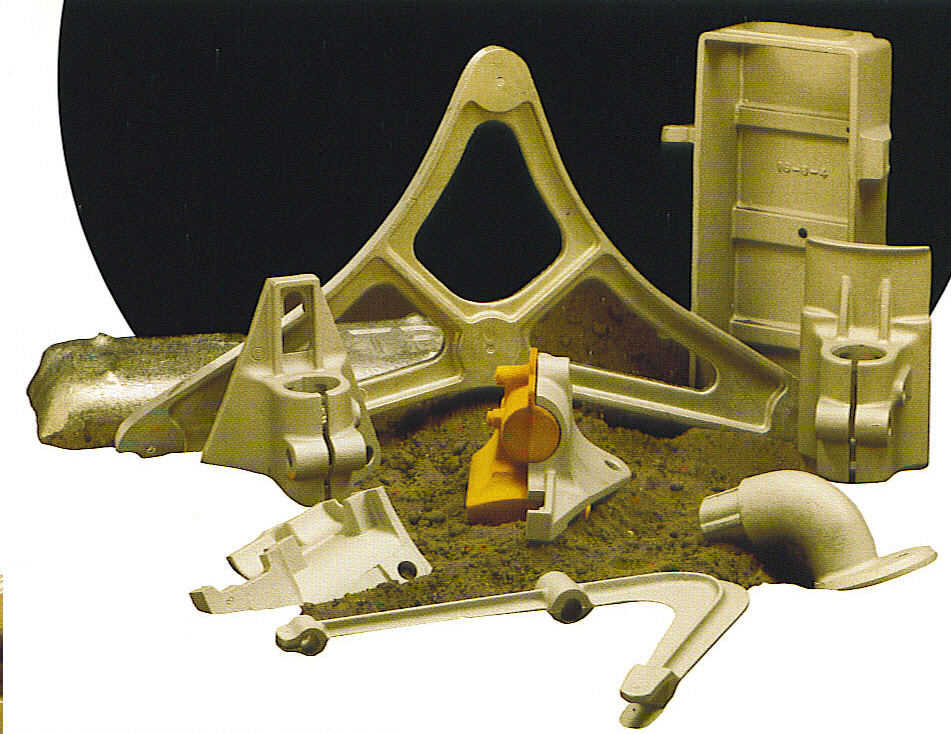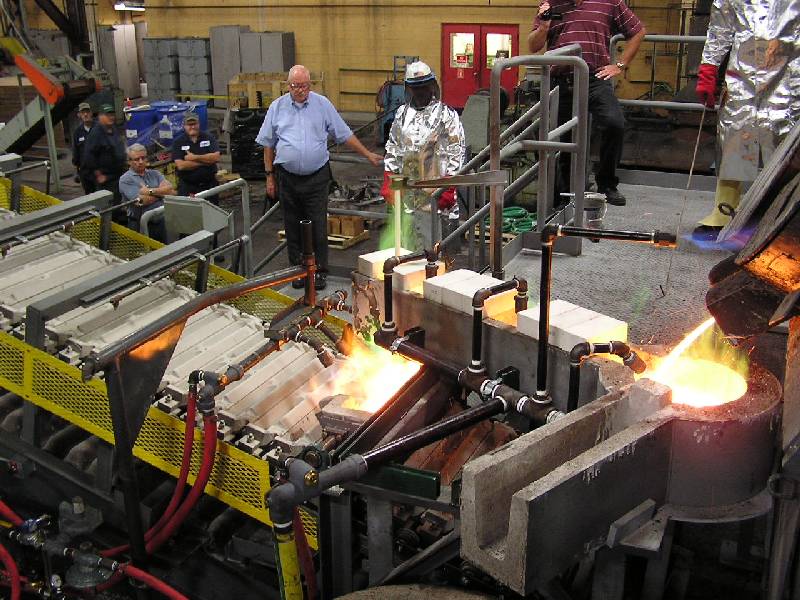Understanding Aluminum Foundry and the benefits for modern applications
Wiki Article
Discover the Various Kinds and Use Aluminum Foundry in Industrial Processes
Aluminum factories play an essential function in various commercial fields. They utilize different spreading techniques, each tailored to fulfill certain manufacturing requirements. From sand spreading's convenience to the effectiveness of die spreading, the choice of an approach can substantially affect production end results. The applications of Aluminum spreadings extend throughout multiple industries, highlighting their relevance. Understanding these procedures and their ramifications can expose a lot more about exactly how Aluminum shapes modern production. What lies ahead in this advancing field?Comprehending Aluminum Foundry Processes
Aluminum Foundry processes are vital in the production industry, changing raw Aluminum into functional parts with a collection of distinct actions. The procedure usually starts with melting Aluminum in a heating system, where specific temperature control is important to achieve the preferred residential or commercial properties in the last item. When melted, the Aluminum is poured into mold and mildews, which can be made for specific shapes and sizes, ensuring effectiveness in production.After cooling and solidifying, the cast elements undertake finishing processes such as machining, trimming, and surface therapy, enhancing their performance and appearance. Quality control procedures are applied throughout, ensuring that each product satisfies market requirements and requirements. The convenience of Aluminum permits its usage in a wide variety of applications, from automobile parts to aerospace parts. Generally, Aluminum Foundry procedures play a substantial function in providing high-quality, lightweight materials that add to numerous commercial improvements.
Sorts Of Aluminum Foundries
Aluminum foundries can be classified into several kinds, each offering details manufacturing demands. Sand spreading factories, die casting foundries, and permanent mold and mildew factories represent the key approaches used in the market. Recognizing the distinctions amongst these kinds is crucial for choosing the proper process for numerous applications.Sand Spreading Foundries
Sand casting foundries stand for a basic technique in the Aluminum casting process, renowned for their flexibility and cost-effectiveness. This method involves producing a mold and mildew from sand, which can be quickly shaped and recycled, enabling the manufacturing of complicated geometries. The process starts with the creation of a pattern, generally made from a durable product, which is then bordered by a blend of sand and binder. Once the mold and mildew is set, liquified Aluminum is gathered and permitted to cool, strengthening into the desired shape. Sand casting is especially helpful for reduced to tool production quantities, supplying high modification and flexibility. The process is commonly used in auto, aerospace, and industrial applications, making it a cornerstone of Aluminum Foundry procedures.Pass Away Casting Foundries
Pass away casting factories represent a remarkable innovation in the Aluminum casting sector, defined by their capability to create high volumes of precision elements. This approach entails requiring molten Aluminum into a mold tooth cavity under high stress, which permits for complex designs and tight resistances. The process is excellent for manufacturing components in numerous markets, including automobile, aerospace, and electronic devices, where uniformity and detail are crucial. Die casting foundries use innovative strategies such as hot-chamber and cold-chamber procedures, each offering distinctive benefits relying on the particular application. Additionally, the rapid production cycles in die spreading considerably enhance effectiveness, making it a preferred choice for automation while keeping superb surface coatings and mechanical properties in the end products.
Permanent Mold Foundries
An additional substantial kind of Aluminum Foundry is the long-term mold and mildew Foundry, which utilizes steel mold and mildews to cast Aluminum elements. This method enables for high precision and repeatability in manufacturing, making it perfect for creating intricate forms and detailed layouts. The mold and mildews are commonly made from steel or iron, supplying longevity and the capability to stand up to the casting process's high temperatures. Irreversible mold and mildew factories are particularly reliable for tool to high production runs, as they supply an equilibrium between price effectiveness and product quality. Furthermore, they supply much better mechanical properties contrasted to sand-cast parts as a result of the rapid air conditioning of the metal in a solid mold and mildew, causing a finer grain structure. This procedure is generally made use of in aerospace and automotive applications.Applications of Aluminum Castings
Aluminum castings offer a vital role throughout different industries because of their light-weight, strength, and rust resistance. In the automotive field, Aluminum castings are generally made use of for engine blocks, transmission situations, and wheels, adding to fuel effectiveness and efficiency. The aerospace industry uses Aluminum spreadings for architectural components, making certain reduced weight without endangering safety.In the building and construction market, Aluminum spreadings are utilized for home window frames, doors, and architectural assistances, improving toughness and aesthetic appeal. Furthermore, the electronic devices sector gain from Aluminum castings in the manufacturing of real estates and warm sinks, supplying effective thermal monitoring.
The medical area likewise leverages Aluminum castings for manufacturing devices and devices, profiting from their biocompatibility. In general, the convenience of Aluminum spreadings permits innovative applications across numerous domain names, attesting their significance in modern-day industrial processes.
Benefits of Utilizing Aluminum in Foundry Production
The advantages of Aluminum in Foundry manufacturing are countless and contribute substantially to its widespread use throughout different industries. One significant advantage is its light-weight nature, which decreases transportation prices and improves energy performance in applications. In addition, Aluminum shows superb corrosion resistance, leading to durable products that need minimal upkeep. Its exceptional thermal and electrical conductivity additionally makes it a suitable selection for elements in vehicle and electric industries.Aluminum's convenience allows for a range of alloy formulations, enabling manufacturers to customize properties such as strength and pliability for specific applications. The material's beneficial spreading qualities help with detailed layouts and fine details, causing top quality ended up items. Aluminum can be reused continuously without losing its honesty, promoting sustainability in manufacturing methods. On the whole, these advantages setting Aluminum as a recommended material in Foundry procedures, driving development and performance throughout multiple markets.
Ingenious Techniques in Aluminum Foundry
As industries require and progress for high-grade Aluminum components boosts, innovative techniques in Aluminum Foundry processes have arised to improve efficiency and accuracy. Advanced computer-aided layout (CAD) systems allow precise modeling of components, lowering material waste and boosting precision (Aluminum Foundry). Furthermore, the adoption of 3D printing technology permits rapid prototyping and the development of complicated geometries that conventional methods battle to achieveThe integration of automation and robotics improves manufacturing lines, minimizing human mistake and increasing throughput. Techniques such as vacuum cleaner spreading and pass away casting additionally boost the high quality of Aluminum items by ensuring uniformity and stamina. The usage of real-time monitoring systems during casting processes enables immediate adjustments, maintaining excellent conditions and minimizing flaws. These ingenious techniques not only enhance efficiency however likewise add to the general quality and integrity of Aluminum components in various commercial applications.
Environmental Factors To Consider in Aluminum Spreading
Ecological considerations in Aluminum casting are increasingly important as markets seek to reduce their ecological impact. Reliable waste administration techniques and discharge decrease strategies play an essential function in attaining lasting techniques within shops. Addressing these problems not only profits the environment yet additionally improves the market's long-lasting stability.Waste Administration Approaches
Sustainability in Aluminum spreading depends upon effective waste monitoring techniques that reduce environmental effect. Foundries create numerous kinds of waste, consisting of scraps, dross, and invested products, which require systematic handling. Applying recycling programs is important, as redeeming Aluminum scrap can greatly lower resources usage and power usage. Furthermore, embracing methods such as closed-loop systems can aid in reusing water and chemicals, therefore decreasing waste discharge. Educating employees concerning waste segregation can boost recycling initiatives and promote a culture of sustainability within the work environment. The integration of modern waste monitoring modern technologies, such as effective sorting and handling devices, further contributes to lessening garbage dump contributions. Eventually, durable waste monitoring strategies are vital for attaining environmental conformity and cultivating lasting Aluminum casting operations.Emission Decrease Techniques
Efficient discharge reduction methods are crucial for reducing the ecological influence of Aluminum spreading procedures (Aluminum Foundry). Various methods have actually been executed to accomplish this goal, including making use of innovative filtering systems that record dangerous particulates and unpredictable natural substances (VOCs) before they go into the environment. Additionally, optimizing heating system operations can greatly minimize power usage and reduced greenhouse gas discharges. The fostering of cleaner modern technologies, such as electrical melting heaters, even more improves sustainability. Implementing closed-loop cooling systems reduces water use and stops thermal contamination. Constant monitoring of emissions assurances conformity with environmental regulations and assists recognize areas for enhancement. By integrating these methods, Aluminum foundries can contribute to a more sustainable industrial process while satisfying environmental requirementsAluminum Foundry
The Future of Aluminum Foundry in Sector
As sectors advance, the future of Aluminum Foundry is positioned for significant transformation driven by improvements in technology and changing market needs. Developments such as automated casting processes, fabricated knowledge, and artificial intelligence are enhancing effectiveness and accuracy in Aluminum production. These innovations not only enhance operations but likewise minimize waste and energy usage, aligning with the sector's concentrate on sustainability.Moreover, the integration of additive manufacturing strategies is reinventing layout opportunities, permitting complicated geometries that were formerly unachievable. As the aerospace and auto industries increasingly demand lightweight materials, Aluminum shops are adapting to fulfill these requirements via tailored alloys and enhanced buildings.
Furthermore, the international promote reusing and circular economic climate methods is guiding foundries towards making use of recycled Aluminum, thereby decreasing environmental influence. Generally, the Aluminum Foundry industry is readied to accept a future identified by versatility, advancement, and sustainability to satisfy progressing industrial demands.
Frequently Asked Inquiries
What Safety Steps Are Necessary in Aluminum Foundries?
In Aluminum foundries, necessary security procedures consist of making use of individual protective devices, appropriate ventilation systems, normal equipment maintenance, training for employees on hazardous products, and adherence to safety and security methods to avoid injuries and crashes.Just How Do Aluminum Foundries Manage Garbage Disposal?
Aluminum factories handle garbage disposal with methodical recycling programs, contaminated materials methods, and adherence to ecological policies. They prioritize lessening waste generation, making certain correct partition, and collaborating with licensed disposal facilities to alleviate ecological effect properly.What Are the Prices Related To Aluminum Foundry Solutions?
The costs related to Aluminum Foundry solutions vary substantially, influenced by factors such as product prices, labor expenses, tools maintenance, and manufacturing volume. Efficient management of these elements is essential for keeping affordable pricing and profitability.
Can Aluminum Foundry Processes Be Automated?
Aluminum Foundry processes can indeed be automated to boost performance and accuracy. Aluminum Foundry. Automation decreases labor prices, decreases human mistake, and permits regular production top quality, making it an increasingly prominent selection in contemporary production environmentsExactly How Does Temperature Affect Aluminum Casting Quality?
Temperature greatly influences Aluminum spreading high quality; elevated temperature levels can boost fluidity yet may lead to issues like porosity. Alternatively, lower temperatures may reduce issues yet can cause bad mold and mildew dental filling and insufficient surface finish.Aluminum Foundry processes are crucial in the manufacturing sector, changing raw Aluminum right into usable parts via a series of well-defined actions. Sand casting foundries stand for a basic approach in the Aluminum spreading procedure, renowned for their adaptability and cost-effectiveness. Pass away casting shops stand for a remarkable improvement in the Aluminum spreading sector, characterized by their ability to produce high quantities of accuracy components. An additional substantial kind of Aluminum Foundry is the permanent mold and mildew Foundry, which uses steel mold and mildews to cast Aluminum elements. As markets demand and develop for top quality Aluminum components increases, cutting-edge techniques in Aluminum Foundry procedures have actually emerged to boost efficiency and precision.
Report this wiki page